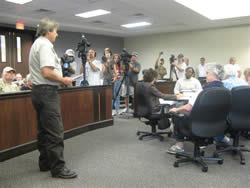
National Fire Plan Success Story
Incident Management Team Assists with Hurricane
Galveston, Texas
National Fire Plan - Community Assistance
2009

Galveston city officials listen to Incident Commander Tony Wilder explain the rapid assessment of damage to infrastructure in the aftermath of Hurricane Ike. Photo courtesy USFWS.
Six days after Hurricane Ike made landfall on Galveston Island, Texas, U.S. Fish and Wildlife Service employees serving on the Southern Area Type 2 Incident Management Team were called to assist the Federal Emergency Management Agency (FEMA) as part of an Infrastructure Assessment Task Force, assessing the impact to residents of the city of Galveston.
The Team arrived in Galveston on September 18, 2008 to support FEMA. The assignment was very different from those the team usually undertakes managing large fires, such as in Virginia and North Carolina earlier in the year. Team Incident Commander Tony Wilder, Fire Management Officer at Mississippi Sandhill Crane National Wildlife Refuge, and team members had to solve atypical problems as they arrived to the hurricane-devastated area. Communication and planning were critical elements as the team established their Incident Command Post with no services or conveniences at their disposal.
Wilder and his team members worked with utility professionals to conduct the infrastructure assessment, including security, water, energy, accessibility, and telecommunications for Galveston. They acquired information by any means possible about the status and condition of these services. Then they were tasked to produce a 72-hour report to outline their findings.
Wilder personally identified with the residents of the area because he lost his home to Hurricane Katrina in 2005. “What this assessment doesn’t show” he said, “is the human element.” Many Service employees and facilities were affected by hurricanes in 2008.
The team also worked extensively with local elected officials and media outlets to keep citizens of the area informed about the situation. In addition to Wilder, six other U.S. Fish and Wildlife Service employees from the Service Southwest, Southeast, Northeast, and Mountain-Prairie Regions worked on the team. Their assignment lasted for 13 days.